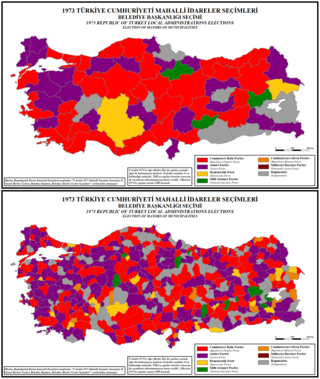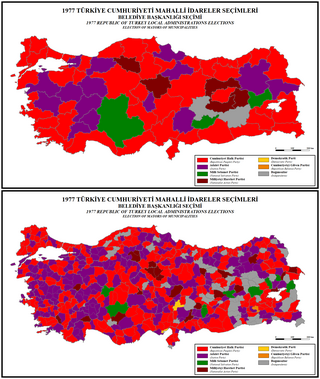| |||||||||||||||||||||||||||||||||||||||||
All 3,215 district municipalities and 16 metropolitan municipalities of Turkey | |||||||||||||||||||||||||||||||||||||||||
|---|---|---|---|---|---|---|---|---|---|---|---|---|---|---|---|---|---|---|---|---|---|---|---|---|---|---|---|---|---|---|---|---|---|---|---|---|---|---|---|---|---|
| |||||||||||||||||||||||||||||||||||||||||
 | |||||||||||||||||||||||||||||||||||||||||
 |
|---|
Local elections were held in Turkey on April 18, 1999, on the same day with the parliamentary election.
| |||||||||||||||||||||||||||||||||||||||||
All 3,215 district municipalities and 16 metropolitan municipalities of Turkey | |||||||||||||||||||||||||||||||||||||||||
|---|---|---|---|---|---|---|---|---|---|---|---|---|---|---|---|---|---|---|---|---|---|---|---|---|---|---|---|---|---|---|---|---|---|---|---|---|---|---|---|---|---|
| |||||||||||||||||||||||||||||||||||||||||
 | |||||||||||||||||||||||||||||||||||||||||
 |
|---|
Local elections were held in Turkey on April 18, 1999, on the same day with the parliamentary election.
| Party | Votes | % | |
|---|---|---|---|
| Democratic Left Party | 5,885,132 | 18.70 | |
| Nationalist Movement Party | 5,401,597 | 17.17 | |
| Virtue Party | 5,185,831 | 16.48 | |
| Motherland Party | 4,730,711 | 15.03 | |
| True Path Party | 4,157,262 | 13.21 | |
| Republican People's Party | 3,487,483 | 11.08 | |
| People's Democracy Party | 1,094,761 | 3.48 | |
| Great Unity Party | 540,239 | 1.72 | |
| Democrat Turkey Party | 292,224 | 0.93 | |
| Freedom and Solidarity Party | 263,814 | 0.84 | |
| Nation Party | 86,481 | 0.27 | |
| Peace Party | 67,448 | 0.21 | |
| Workers' Party | 66,175 | 0.21 | |
| Democratic Party | 41,947 | 0.13 | |
| Liberal Democratic Party | 30,314 | 0.10 | |
| Labour Party | 29,499 | 0.09 | |
| Socialist Power Party | 22,825 | 0.07 | |
| Rebirth Party | 17,335 | 0.06 | |
| Democracy and Peace Party | 6,593 | 0.02 | |
| Changing Turkey Party | 3,143 | 0.01 | |
| Independents | 56,879 | 0.18 | |
| Total | 31,467,693 | 100.00 | |
|
|
|
|

The politics of Turkey take place in the framework of a constitutional republic and presidential system, with various levels and branches of power.

Antalya is the fifth-most populous city in Turkey as well as the capital of Antalya Province. It is seen as the "capital of tourism" in Turkey. Located on Anatolia's southwest coast bordered by the Taurus Mountains, Antalya is the largest Turkish city on the Mediterranean coast outside the Aegean region with over 2.6 million people in its metropolitan area.

The Justice and Development Party, abbreviated officially as AK Party in English, is a political party in Turkey self-describing as conservative-democratic. Third-party sources often refer to the party as national conservative, social conservative and espousing neo-Ottomanism. The party is generally regarded as being right-wing on the political spectrum, although some sources have described it as far-right since 2011. It is one of the two major parties of contemporary Turkey along with the Republican People's Party (CHP).

The Republican People's Party is a Kemalist and social democratic political party in Turkey. It is the oldest political party in Turkey, founded by Mustafa Kemal Atatürk, the first president and founder of the modern Turkish Republic. The party is also cited as the founding party of modern Turkey. Its logo consists of the Six Arrows, which represent the foundational principles of Kemalism: republicanism, reformism, laicism (Laïcité/Secularism), populism, nationalism, and statism. It is currently the second largest party in Grand National Assembly with 130 MPs, behind the ruling conservative Justice and Development Party (AKP).
The Felicity Party is an Islamist Turkish political party. It was founded in 2001, and mainly supported by conservative Muslims in Turkey.

Elections in Turkey are held for six functions of government: presidential elections (national), parliamentary elections (national), municipality mayors (local), district mayors (local), provincial or municipal council members (local) and muhtars (local). Apart from elections, referendums are also held occasionally.

The Left Party is a secular, socialist political party in Turkey. The Party was founded after Freedom and Solidarity Party decided to change its name as the Left Party at the 8th Extraordinary Congress held in Ankara on December 22, 2019.

The Government of Turkey is the national government of Turkey. It is governed as a unitary state under a presidential representative democracy and a constitutional republic within a pluriform multi-party system. The term government can mean either the collective set of institutions or specifically the Cabinet.

Local elections were held in Turkey on 29 March 2009. The overall winner was the ruling party Justice and Development Party, although the party saw a decline in its vote relative to the 2007 general election. The leading opposition party, the social democratic Kemalist CHP, increased its vote share, as did a number of smaller parties including the SP, DTP and BBP, whose party leader Muhsin Yazıcıoğlu had died in a helicopter crash four days before the election. The third largest party, the Turkish nationalist MHP, enjoyed a more modest vote surge. The election was not contested by Cem Uzan's GP. The AKP failed to take certain provinces it had publicly targeted, such as Diyarbakır, İzmir and Urfa, and did not achieve its goal of exceeding 47% of the overall vote. There was localized election-related fighting in southeastern Turkey, in which five people were reported to have been killed and about a hundred injured.

The Peace and Democracy Party was a Kurdish political party in Turkey existing from 2008 to 2014.

The Turkish local elections of 2004 were held throughout the eighty-one Provinces of Turkey on 28 March 2004 in order to elect both mayors and councillors to local government positions. All 16 metropolitan and 3,193 district municipalities were up for election, while 3,208 provincial and 34,477 municipal councillors were also elected. More than 50,000 neighbourhood presidents (muhtars) were also elected, though these do not have any political affiliations.

Local elections were held in Turkey on 25 March 1984. In the elections, both the mayors and the local parliaments were elected. The figures presented below are the results of the local parliament elections.

Local elections were held in Turkey on 2 June 1968. In the elections, both the mayors and the local parliaments were elected. The figures presented below are the results of the local parliament elections.

Local elections were held in Turkey on 17 November 1963. In the elections, both the mayors and the local parliaments were elected. The figures presented below are the results of the local parliament elections.

Local elections were held in Turkey on 26 March 1989. In the elections, both the mayors and the local parliaments were elected. The figures presented below are the results of the local parliament elections.

Local elections were held in Turkey on 9 December 1973. In the elections, both the mayors and the local parliaments were elected. The figures presented below are the results of the local parliament elections.

Local elections were held in Turkey on 11 December 1977. In the elections, both the mayors and the local parliaments were elected. The figures presented below are the results of the local parliament elections.

Local elections were held in Turkey on 30 March 2014, with some repeated on 1 June 2014. Metropolitan and district mayors as well as their municipal council members in cities, and muhtars and "elderly councils" in rural areas were elected. In light of the controversy around the elections, it was viewed as a referendum on the government of Prime Minister Recep Tayyip Erdoğan. About 50 million people were eligible to vote.
The electoral system of Turkey varies for general, presidential and local elections that take place in Turkey every five years. Turkey has been a multi-party democracy since 1950, with the first democratic election held on 14 May 1950 leading to the end of the single-party rule established in 1923. The current electoral system for electing Members of Parliament to the Grand National Assembly has a 7% election threshold.

The Turkish local elections of 2019 were held on Sunday 31 March 2019 throughout the 81 provinces of Turkey. A total of 30 metropolitan and 1,351 district municipal mayors, alongside 1,251 provincial and 20,500 municipal councillors were elected, in addition to numerous local non-partisan positions such as neighbourhood wardens (muhtars) and elderly people's councils.